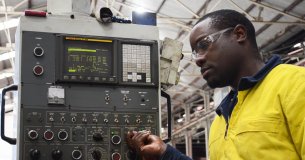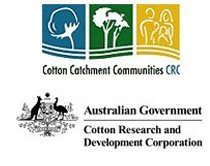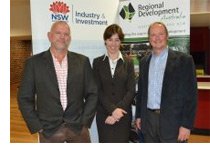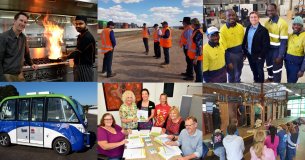-
Featured Items
-
Featured Resources
 Funding & Grants
Don't miss out on funding opportunities. Stay informed with our up to date online listings and email notifications.
Read More
Funding & Grants
Don't miss out on funding opportunities. Stay informed with our up to date online listings and email notifications.
Read More
 Skilled Migration
Our services help both applicants and employers, to learn more, develop plans, submit applications, and settle in.
Read More
Skilled Migration
Our services help both applicants and employers, to learn more, develop plans, submit applications, and settle in.
Read More
 Research and Analysis
Good research and analysis makes the case. How can our resources and services help your project or application?
Read More
Research and Analysis
Good research and analysis makes the case. How can our resources and services help your project or application?
Read More
 Information & Data Resources
With resources like REMPLAN, Regional Knowledge Base, and decades of data, discover how we can help your project.
Read More
Information & Data Resources
With resources like REMPLAN, Regional Knowledge Base, and decades of data, discover how we can help your project.
Read More
-
Stay InformedSubscribe to one or more of our regular email subscriptions, to be kept up to date on news and funding opportunities for the region
-
-
Our Region
- Our Region
- Regional Plan
- Regional Data
- Current Regional Issues
- Population Migration Analysis for 2016-21
- Job Vacancies Continue at All-Time High
- National Debt - What it Means for Our Economy?
- The True Value of Home Solar
- The Economic Impacts of Local Government Amalgamations
- State of the Regions Report 2014-15
- Antifragility - A different take on regional economic development
- Biohubs - Collaborative Waste Management
- Attracting New Residents
- Socio-Economic Impacts of the Murray Darling Basin Plan
- Murray Darling Basin Water Recovery
- Growing Businesses
- The Northern Inland Economy
- Geographical Overview
- Major Industry Sections
- Our Services
- Grants and Funding
-
Skilled Migration
- Skilled Migration
- Skilled Employer Sponsored Regional Visa
- Skilled Work Regional Visa (subclass 491)
- Temporary Seasonal Workers
- Designated Area Migration Agreement (DAMA)
- Helpful Information for Visa Holders
- Information for Employers
- Case Studies
- Payment Details
- Advice & Further Information
- Contact Details
- News & Events
-
Our Projects
- Our Projects
- Current Projects
- Skilled Migration
- Wool Works - Wool Training Schools
- Metal Works - Welding and Fabrication Schools
- Come On Inland
- Stories of Resilience
- Alt Brothers Beekeeping - Glen Innes
- Carelle's Toy Store - Glen Innes
- Greenhill Orchards - Arding
- Gwydir Meats - Warialda
- Kaputar Motors - Narrabri
- Moonbi General Store - Moonbi
- Sandstock - Tingha
- Sherelle Fashions - Tenterfield
- Sleepy Merino - Inverell
- Tenterfield Chamber of Toursim, Industry and Business - Tenterfeild
- The Welders Dog - Armidale
- Walcha Veterinary Supplies - Walcha
- AGCAP - Agribusiness Careers & Professions
- Northern Inland Regional Investment Profile
- Past Projects
- Digital Economy Strategy
- Business Growth Project
- Go Digital
- How to Start an Online Business
- Create Your Website Using Squarespace
- How to Edit Your Squarespace Site - Part 1
- How to Edit Your Squarespace Site Part 2
- Add a Shop to Your Squarespace Site
- Start a Blog and Find out What Customers are Searching
- 14 Tips For a Better Blog Post
- Which Social Media Platforms are Best for Your Business
- How to Use Facebook Effectively For Your Business – Part 1
- How to Use Facebook Effectively For Your Business – Part 2
- Instagram Tips for Business
- Catching Up, More Instagram & Dealing with Haters
- Getting Started with Twitter for Business
- Social Media Scheduling Tools
- How to Start an Etsy Shop – Part 1 – Research
- How to Start an Etsy Shop – Part 2 – Signup
- Online Security for Your Business
- Product Photography and Website Images: Your Guide
- 5 Tips to Improve your Productivity in your Business
- Best Online Business Resources
- How to Improve Your Communication Skills and Win More Clients
- NBN Coordinator
- Putting Power Back in the Regions
- Road Freight Study
- Town Audit Benchmarks
- Food and Wine
- Youth Survey
- Digital TV Switchover Assistance
- Northern Inland Transport Guide
- Live.Train.Work
- Northern Inland Innovation Awards
- Northern Inland Innovation Awards - 2017
- Northern Inland Innovation Awards - 2016
- Northern Inland Innovation Awards - 2015
- Northern Inland Innovation Awards - 2014
- Northern Inland Innovation Awards - 2013
- Northern Inland Innovation Awards - 2012
- Norther Inland Innovation Awards - 2011
- Prime Super Northern Inland Innovation Awards - 2010
- Prime Super Northern Inland Innovation Awards - 2009
- Northern Inland Innovation Awards - 2007
- Northern Lights Project
- NBN Smart Home
- Murray Darling Basin
- Moree Plains Business Workshops
- Namoi Investment Prospectus
- Industrial Land
- Bioenergy and Local Electricity Retailing
- Northern Inland Business Energy Assessment
- Skills for the Future
- Impacts of COVID-19 on Businesses
- Past Projects of NIRDB
- Aboriginal Employment and Enterprise in the Gunnedah Region
- Art as an Industry
- Aviation Survey
- Farm Forestry - Northern Inland Forestry Investment Group
- New England North West Film Strategy
- Northern Inland Excellence in Business Awards
- Food and Wine 2003 - 2008
- Prime Super Northern Inland Innovation Awards 2009
- Regional Business Networking Program
- Regional Leadership Course 2008
- Viticulture Strategy 2002-2003
- About Us
- Contact Us
- Other Resources
- Privacy and Legal
- Search
Back to Newsletters








December 2011 Newsletter
Wednesday 28th of December 2011
In This Issue
- Welcome From The Chair
- Audit of Northern Inland Highlights Gaps in Services and Infrastructure
- Rural and Regional Health Australia
- Sustaining Rural Communities Conference 2012
- Town Success Story
- Region Hears about Skilled Migration Opportunities
- Grants, Funding Opportunities and Tenders
Welcome From The Chair

Dear Fellow Northern Inland Residents,
As the year draws to a close, I like to sit back and take a look at what has happened over the past twelve months. It has been a huge year both within the region and nationally. We have faced severe weather events, changing government policy that affects us all and yet the Northern Inland has prospered. Over the last twelve months the Northern Inland has received federal and state funding for a number of projects including $8 million for the upgrade of Freeman House in Armidale, a much needed facility in our region. It’s encouraging to see people are moving to our region to take advantage of our wonderful lifestyle and regional businesses are doing well.

2012 is set to be another big year for us all with the upcoming announcement of the second round of the Regional Development Australia Fund as well as whatever else the year can throw at us. I’d like to take this opportunity to wish you all a very safe and happy Christmas Season and the best of wishes for an exciting year to come.
Mal Peters, Chair
Audit of Northern Inland Highlights Gaps in Services and Infrastructure

A project to compare services and infrastructure in 33 towns in the Northern Inland with those of a similar size throughout the state has identified major shortfalls in the Northern Inland’s Health Services.
Regional Development Australia Northern Inland (RDANI) Chairman, Mal Peters, said this project was invaluable in comparing objectively if our service levels are up to scratch rather than taking a stab in the dark and will now become important in negotiating for increased services and infrastructure in the region.
The project identified where towns of similar size have deficiency in services or necessary infrastructure requirements that would maintain and promote economic and community development within our region and against two adjoining regions.

Some examples of gaps in the region include:
- Tamworth falls short of other large regional centres’ access to doctors;
- Many of our towns are under-provisioned in relation to aged-care beds;
- Services for people with disabilities as well as schools for children with special needs are lacking in many of our smaller towns;
- Many small towns have no permanent local dentist and rely instead on visiting services;
- In towns smaller than 1000 people there is almost uniform lack of access to doctors and dentists;
- Guyra and Gunnedah need more doctors;
- Gunnedah, Moree, Glen Innes, Tenterfield and Narrabri fall well below the national average for access to dentists;
- Gunnedah and Moree need more hospital beds; and
- Glen Innes, Narrabri, Kootingal and Werris Creek need more teachers.
This report is informative reading for local councils and governments at all levels in the region who will be able to easily identify gaps and guide future initiatives to fill those needs. It’s all about making our region more liveable and viable for residents and businesses.
The project was jointly funded by NSW Trade and Investment, and undertaken by the University of New England’s Division of Geography and Planning.
Rural and Regional Health Australia

Rural and Regional Health Australia (RRHA) has recently been established by the Australian Government’s Department of Health and Ageing and provides a central entry point on information about Commonwealth regional health and ageing programs for people living in regional Australia.
RRHA has three points of contact for rural and regional health consumers and practitioners:
- www.ruralhealthaustralia.gov.au
- A toll free information line 1800 899 538
- An email service infoRRHA@ruralhealthaustralia.gov.au
The website provides details of existing and forthcoming programs and initiatives aimed at improving health services in regional, remote and rural Australia. Its interactive map shows health services in specific locations in all states and territories and will be progressively updated over time. This service is sure to become a valuable tool for both the residents of rural and regional Australia and health professionals. RRHA also works in conjunction with Health Direct Australia. Health Direct Australia is a nation-wide, 24 hours a day, seven days a week service that provides access to healthcare triage, health advice and health information. Health Direct Australia is a brilliant service for regional and rural Australia and provides much needed peace of mind for many.
For more information about Health Direct Australia please visit www.healthdirect.org.au or call 1800 022 222
Sustaining Rural Communities Conference 2012

The third annual Sustaining Rural Communities Conference is being held by the Cotton Catchment Communities CRC at the Crossing Theatre Narrabri in April 2012.
In recent years, rural communities have been faced with significant challenges including weather events such as the recent devastating floods, the mineral resources boom and significant changes in government policy relating to carbon and water. These issues, and others, all have the potential to change the face of rural communities forever and so there is a need to understand the current research, communities’ response to the issues and how communities can better plan for the future.
The 2011 event attracted up to 170 delegates each day from around Australia including representatives from the agricultural, mining, manufacturing, finance, tourism, transport, science, education and health industries as well as government representatives from all levels including local, state and federal.
To register your interest in attending the 2012 event please go to www.sustainingruralcommunities.org.au
Town Success Story

This month’s town success story is a little different to some of our previous stories. This month’s comes from Chattanooga in Tennessee USA and the success it has found since implementing a high speed, fibre based broadband network.
Forty years ago, the industrial centre of Chattanooga, Tennessee was voted the dirtiest in the United States. Today however, it is attracting the sort of business development and investment that regional centres in Australia dream about.
The key ingredient in the transformation of Chattanooga is broadband. The town made famous by the song about the eponymous ‘choo-choo’ was the first in the US to implement a high-speed, fibre-based broadband network with speeds of up to 1 gigabit per second.
The broadband network has been a key element, along with a progressive local government, in the city’s ability to attract investment from organisations such as Amazon and Volkswagen. These two companies alone have created over 3000 jobs for the city and surrounding areas.
With the rollout of the NBN progressing across the Northern Inland over the next few years, we can also expect to use the network as a lure for high tech companies to move to our wonderful region.
Region Hears about Skilled Migration Opportunities

Employing workers from oversees is an essential option for many Northern Inland NSW employers, who cannot source the labour that they need locally. The processes involved can be time consuming and complex. Misunderstanding the rules and procedures or making mistakes can negatively impact upon a business or organisation's operations as well as visa applicants or holders.
Recognising the important role that skilled migration plays in the region, Regional Development Australia Northern Inland (RDANI) funded a week-long tour of the region by one of Australia's leading authorities on skilled and student migration, Michael Jeremy. Free seminars for regional employers, businesses, organisations and visa applicants took place last week in Tamworth, Armidale, Goondiwindi and Moree, with one-on-one meetings around the region also benefiting employers. The aim of the workshops was to fill knowledge gaps created by significant migration law changes, which took effect on July 1 this year.
The workshops addressed such areas as: Regional Skilled Migration programmes; 457 Work Visas; Australian employer obligation to the Immigration Department; the do’s and don'ts of employing temporary visa holders; best practice approaches to working with the Immigration Department; and what RDANI can do to help local employers use immigration to achieve good business outcomes and get the skilled workers they need.
For more information on skilled migration please contact Senior Project Officer Kim-Trieste Hastings on (02) 6771 2790
Grants, Funding Opportunities and Tenders
As RDANI has access to a plethora of grants and funding opportunities, as of this month, there will be a new Grants Portal on our website which can be found here http://www.rdani.org.au/our-region/grants-and-funding-opportunities.php
This page will highlight a selection of the funding opportunities available as well as provide further resources on how to find the appropriate grant. The new portal will inform communities, businesses and industries within the region of the many government, business and philanthropic grants available.
Tenders
Tendering is becoming a vital part of how many businesses in the Northern Inland operate on a day to day basis. RDANI would like to highlight the many sources of Tender information available.
Both state and federal governments often have projects open for tender. For more information on NSW State Government Tenders please go to https://tenders.nsw.gov.au for further information on Federal Government Tenders please go to www.tenders.gov.au
Commercial tenders are also becoming more popular. For more information on the commercial tendering process please go to www.tenderlink.com or www.tenders.com.au
The Industry Capability Network (ICN) creates opportunity for New South Wales and Australian industry.
If you are developing a supply chain and need a competitive local source of supply, ICN can help.
ICN bridges the information gap between buyers and sellers by advising on:
- supply chain development
- import replacement
- local industry capability and capacity
For more information please go to www.icn.org.au
Related Pages







 Latest News
Latest News
